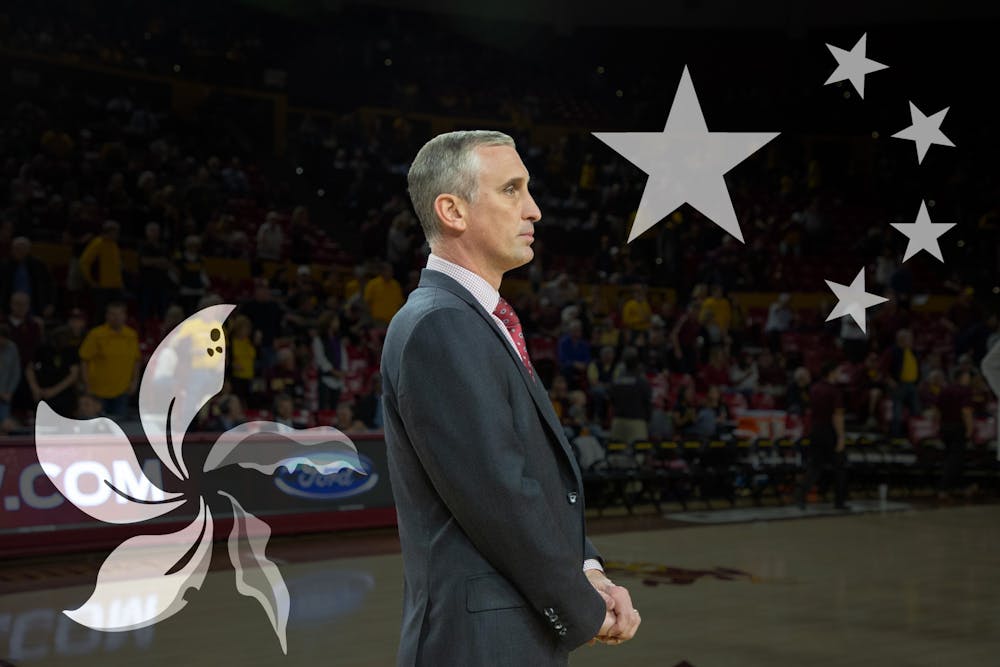In recent years, prominent American athletes have weighed in on numerous political and social issues, from declining visits to the Trump White House to donning shirts in support of the Black Lives Matter movement.
But when the NBA found itself embroiled in an ongoing geopolitical controversy over the Hong Kong protests, it also tied up the U.S., China and communities in between — ASU included.
Nearly a year after the Pac-12 chose ASU and Colorado to play in Shanghai, the two teams find themselves wrapped in the political controversy around China, Hong Kong and the NBA. In light of the issue, the University has expressed support for the trip, while opinions within the ASU community are mixed.
The team has deflected questions so far, addressing the educational benefits of a trip to China instead of the political controversies, and the Pac-12 has echoed the same sentiments.
Education versus politics
ASU's trip to China comes nearly a month after the NBA, which has had a prominent business relationship with China since the 1980s, dealt with backlash from the country after Houston Rockets general manager Daryl Morey supported Hong Kong protesters in a tweet that has since been deleted.
When asked about the issue at a media availability on Oct. 30, ASU men's basketball head coach Bobby Hurley focused on the team's opportunity to experience and educate themselves on Chinese culture, distancing himself and the team from the NBA's controversy.
"We talked with the guys a lot about what we do," Hurley said. "We don't get involved in what happened with the NBA. We're a different entity. This is a different situation.
"China is very passionate about the game of basketball. We're very excited about this trip."
However, some members of the ASU community see it differently. Arjun Rondla, a freshman studying political science, wrote a letter to The State Press stating that ASU affirms a complicit stance to China’s actions by sending the team to play in the country and not speaking up.
"By increasing the Pac-12’s presence in China, China’s authoritarian practices will undoubtedly creep into American academia and the NCAA," Rondla wrote in the letter. "China’s practices are legitimized by this normalcy and ASU basketball is helping to provide that normalcy."
Why the Hong Kong protests are happening
The Hong Kong extradition bill, introduced in April, allowed mainland China to create a process to transfer fugitives between the country and Hong Kong, sparking outrage among Hong Kong’s population.
Hong Kong citizens staged multiple protests to protect the built-in security of their government. This included calling for a chief executive to step down, suspension of the bill and eventually the withdrawal of the bill.
Despite the citizens of Hong Kong achieving part of their goal, they are continuing their protests that focus on democratic reform and a crackdown on police violence.
The Pac-12 is in its fifth year of operation of the China Game. The conference works in conjunction with the Federation of University Sports of China, a subsidiary of China’s Ministry of Education.
Other people in ASU's community think the best option is to remain silent and play the game. Gail Rhodes, a professor at the Walter Cronkite School of Journalism and Mass Communication teaching Sports Ethics, said the team shouldn't cross into the political discussion.
"You've been invited to play in China and selected because of the large number of Chinese students who attend ASU and the partnerships the school has with China," Rhodes said. "I think it would be bad form or downright rude to your host to initiate any comments about what's happening in Hong Kong."
At a media availability on Oct. 30, ASU men's basketball junior guard Remy Martin, said he and the team took a class about Chinese culture and expressed his desire to visit the country.
"Not many people get to go on a trip to China," Martin said. "It’s a different culture, and I’m open to it."
Pac-12 head of communications Andrew Walker also emphasized the educational benefits of the international trip, highlighting that sports and education “have the power to bring people and cultures together, and to support mutual understanding and learning.”
Leaving diplomacy off the hardwood
ASU partners extensively with China to create various programs to provide educational opportunities. These programs include the InterAsia Program, the Global Health Innovators Program, the American Experience Initiative and more.
In a statement to The State Press, the University said it viewed the NBA's issue as no reason to shut its doors, citing the University's Chinese population and their partnerships with the country.
"The upcoming game in China will be an excellent educational and cultural opportunity for our students," a University spokesperson said. "The NBA issues have nothing to do with us. Further, there are things happening in every country that some might find disagreeable. From our perspective, that’s not a reason to shut down and disengage. Oftentimes, it’s a reason to engage."
Rondla also believes a reason for the small amount of public complaints to the Pac-12 for the China Game relates to the difference in exposure of the conference.
"I believe there isn’t a larger outcry because the NBA has advertised their games in China heavily before they play them, more so than ASU," Rondla said.
Hjorleifur Jonsson, a professor at ASU’s School of Human Evolution and Social Change teaching Sports and Culture, said that while sports may raise the subject of politics, it’s best to leave the two subjects apart.
"I would not want to insist that basketball players serve anybody's political agendas," Jonsson said. "Leave such things to politicians, mass movements and diplomats."
Reach the reporter at jhorst2@asu.edu and follow @HorseySeven on Twitter.
Like State Press Sports on Facebook and follow @statepresssport on Twitter.
Jeffrey Horst is the digital editor-in-chief of The State Press. He previously served as the publication's sports editor and worked at Cronkite News and ArizonaSports.com.




